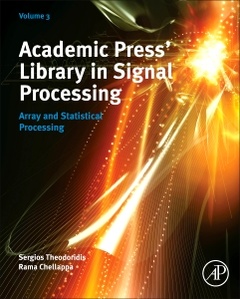Description
Academic Press Library in Signal Processing
Array and Statistical Signal Processing
Academic Press Library in Signal Processing Series
Coordinators: Viberg Mats, Zoubir Abdelhak
Editors-in-Chief: Theodoridis Sergios, Chellappa Rama
Language: English
Subject for Academic Press Library in Signal Processing:
Publication date: 09-2013
1012 p. · 19x23.3 cm · Hardback
Out of Print
1012 p. · 19x23.3 cm · Hardback
Out of Print
Description
/li>Contents
/li>Readership
/li>Biography
/li>Comment
/li>
This third volume, edited and authored by world leading experts, gives a review of the principles, methods and techniques of important and emerging research topics and technologies in array and statistical signal processing.
With this reference source you will:
- Quickly grasp a new area of research
- Understand the underlying principles of a topic and its application
- Ascertain how a topic relates to other areas and learn of the research issues yet to be resolved
Introduction to Statistical Signal Processing; Model Order Selection; Non-Stationary Signal Analysis Time-Frequency Approach; Bayesian Computational Methods in Signal Processing; Distributed Signal Detection; Quickest Change Detection; Geolocation—Maps, Measurements, Models, and Methods; Performance Analysis and Bounds; Diffusion Adaptation Over Networks; Array Signal Processing: Overview of the Included Chapters; ntroduction to Array Processing; Adaptive and Robust Beamforming; Broadband Beamforming and Optimization; DOA Estimation Methods and Algorithms; Subspace Methods and Exploitation of Special Array Structures; Performance Bounds and Statistical Analysis of DOA Estimation; DOA Estimation of Nonstationary Signals; Source Localization and Tracking; Array Processing in the Face of Nonidealities; Applications of Array Signal Processing
R&D engineers in signal processing and wireless and mobile communications
Sergios Theodoridis is professor of machine learning and signal processing with the National and Kapodistrian University of Athens, Athens, Greece and with the Chinese University of Hong Kong, Shenzhen, China.
He has received a number of prestigious awards, including the 2014 IEEE Signal Processing Magazine Best Paper Award, the 2009 IEEE Computational Intelligence Society Transactions on Neural Networks Outstanding Paper Award, the 2017 European Association for Signal Processing
(EURASIP) Athanasios Papoulis Award, the 2014 IEEE Signal Processing Society Education Award, and the 2014 EURASIP Meritorious Service Award. He has served as president of EURASIP and vice president for the IEEE Signal Processing Society and as Editor-in-Chief IEEE Transactions on Signal processing. He is a Fellow of EURASIP and a Life Fellow of IEEE.
He is the coauthor of the best selling book Pattern Recognition, 4th edition, Academic Press, 2009 and of the book Introduction to Pattern Recognition: A MATLAB Approach, Academic Press, 2010.
Prof. Rama Chellappa received the B.E. (Hons.) degree from the University of Madras, India, in 1975 and the M.E. (Distinction) degree from Indian Institute of Science, Bangalore, in 1977. He received M.S.E.E. and Ph.D. Degrees in Electrical Engineering from Purdue University, West Lafayette, IN, in 1978 and 1981 respectively. Since 1991, he has been a Professor of Electrical Engineering and an affiliate Professor of Computer Science at University of Maryland, College Park. He is also affiliated with the Center for Automation Research (Director) and the Institute for Advanced Computer Studies (Permanent Member). In 2005, he was named a Minta Martin Professor of Engineering. Prior to joining the University of Maryland, he was an Assistant (1981-1986) and Associate Professor (1986-1991) and Director of the Signal and Image Processing Institute (1988-1990) at University of Southern California, Los Angeles.
Over the last 29 years, he has
He has received a number of prestigious awards, including the 2014 IEEE Signal Processing Magazine Best Paper Award, the 2009 IEEE Computational Intelligence Society Transactions on Neural Networks Outstanding Paper Award, the 2017 European Association for Signal Processing
(EURASIP) Athanasios Papoulis Award, the 2014 IEEE Signal Processing Society Education Award, and the 2014 EURASIP Meritorious Service Award. He has served as president of EURASIP and vice president for the IEEE Signal Processing Society and as Editor-in-Chief IEEE Transactions on Signal processing. He is a Fellow of EURASIP and a Life Fellow of IEEE.
He is the coauthor of the best selling book Pattern Recognition, 4th edition, Academic Press, 2009 and of the book Introduction to Pattern Recognition: A MATLAB Approach, Academic Press, 2010.
Prof. Rama Chellappa received the B.E. (Hons.) degree from the University of Madras, India, in 1975 and the M.E. (Distinction) degree from Indian Institute of Science, Bangalore, in 1977. He received M.S.E.E. and Ph.D. Degrees in Electrical Engineering from Purdue University, West Lafayette, IN, in 1978 and 1981 respectively. Since 1991, he has been a Professor of Electrical Engineering and an affiliate Professor of Computer Science at University of Maryland, College Park. He is also affiliated with the Center for Automation Research (Director) and the Institute for Advanced Computer Studies (Permanent Member). In 2005, he was named a Minta Martin Professor of Engineering. Prior to joining the University of Maryland, he was an Assistant (1981-1986) and Associate Professor (1986-1991) and Director of the Signal and Image Processing Institute (1988-1990) at University of Southern California, Los Angeles.
Over the last 29 years, he has
- Quick tutorial reviews of important and emerging topics of research in array and statistical signal processing
- Presents core principles and shows their application
- Reference content on core principles, technologies, algorithms and applications
- Comprehensive references to journal articles and other literature on which to build further, more specific and detailed knowledge
- Edited by leading people in the field who, through their reputation, have been able to commission experts to write on a particular topic
© 2024 LAVOISIER S.A.S.




